137 - A Strange Week
Thursday, February 19, 2015
I’ve never been one for the nine-to-five. And fortunately, I guess I’ve never really had to do it. Journalism involved some quite strange hours, as did provincial and touring theatre. Campaigning for the rights of community care service-users and attending late-night Council meetings continued the irregularity, as did freelance training. But retirement? That should be a whole lot more straightforward. You’d think.
You expect your life to change when you take early retirement. And when you move to another country. But you also have some expectations of what those changes might mean, how life might pan out. Relaxing, breakfasting on the patio, watering the lemon tree, taking a light tapas lunch at a local bar, reading a lot, perhaps joining a local book club, and gently exploring southern Spain. It hasn’t turned out quite as expected. another country. But you also have some expectations of what those changes might mean, how life might pan out. Relaxing, breakfasting on the patio, watering the lemon tree, taking a light tapas lunch at a local bar, reading a lot, perhaps joining a local book club, and gently exploring southern Spain. It hasn’t turned out quite as expected.
It’s been a seriously odd week. I’m writing this crammed into a Ryanair seat, on a visit to Dorset. As the snow-capped peaks of northern Spain slowly slip away behind us, memories of the past week jostle for space, fighting for top slot.
Last week I went back to college. I started the B2 Spanish course at La Escuela Oficial de Idiomas in Málaga. Out of twenty students, I am the only Brit. My co-students hail from Syria, Korea, Iran, Brazil, France, Russia, Ukraine, Austria, Morocco … a total of 16 countries. A fabulous mix, and all highly committed to improving their Spanish. It’s an intensive course, four mornings a week for four months. Once a week I go in early to do the breakfast shift with Los Ángeles Malagueños de la Noche. Another day I stay after class to do a lunch shift then wander through central Málaga finding new bars and new galleries.
One day a week I head straight from class to meet up with Jose. Although we use both languages, it has long stopped being an intercambio, it slipped unnoticed into a good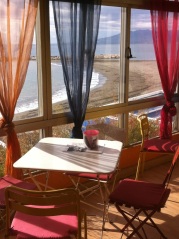 friendship. Last week when I reached the cafe he was reading a stapled printout, preparing for a training session he has to deliver. Discovered by Manchester Metropolitan Police a few years ago, and translated from Arabic into English, it is the manual for Al-Qaeda cells in Europe. I skimmed through it, and clarified a couple of unclear sections that Jose had highlighted. It was frightening stuff. Fascinating, but hugely depressing. The sheer horror of its stated priorities and methods was chilling to read, the horror not diminished by the juxtaposition of reading it in a sunny Costa del Sol beach bar. friendship. Last week when I reached the cafe he was reading a stapled printout, preparing for a training session he has to deliver. Discovered by Manchester Metropolitan Police a few years ago, and translated from Arabic into English, it is the manual for Al-Qaeda cells in Europe. I skimmed through it, and clarified a couple of unclear sections that Jose had highlighted. It was frightening stuff. Fascinating, but hugely depressing. The sheer horror of its stated priorities and methods was chilling to read, the horror not diminished by the juxtaposition of reading it in a sunny Costa del Sol beach bar.
Back in Colmenar we had our weekly intercambio group. Initially started to help a few local Spaniards to improve their English pronunciation, it has morphed into an intercambio and now some of the English who come are taught new phrases to practise during the week. Two young biologists from the honey museum attend, and I found myself shouting “BEE-keepers” and “BEE-hives” with them, trying to correct their pronunciation. Both were swallowing the first, stressed syllable (clearly the most important!) and were saying “be-KIPP-ers” and “be-HIVES”. The Spanish language never puts two of the same vowel together in one syllable, so words like SHEEP and BOOT are notoriously difficult for them. And BEE apparently. Which is unfortunate if you work in the bee industry. Two young biologists from the honey museum attend, and I found myself shouting “BEE-keepers” and “BEE-hives” with them, trying to correct their pronunciation. Both were swallowing the first, stressed syllable (clearly the most important!) and were saying “be-KIPP-ers” and “be-HIVES”. The Spanish language never puts two of the same vowel together in one syllable, so words like SHEEP and BOOT are notoriously difficult for them. And BEE apparently. Which is unfortunate if you work in the bee industry.
I got nobbled in the town hall for a quick photo-shoot for which I was woefully unprepared. I was just popping in to update Paco at the village’s educational charity about progress (or lack of it) on our project. He had other ideas, and summonsed Pepe and his camera to grab a pic of us together. It was his last day in the other part of his job, as Tesorero (Finance Officer) at the town hall, and he wanted the photo taken in the formality of his office, so I couldn’t refuse. But I feel my casual cut-off t-shirt slightly spoils the effect. The scroll is written in florid, almost Baroque language. High Spanish at its most colourful. One sentence escaped me and I typed it into Google Translate, to be informed that I was being thanked for donating my large bra. Umm, I don’t think so! Always better to use my proper Spanish dictionary, which (all in Spanish) explains each word more straightforwardly. What a relief – it turns out that sostén doesn’t only mean bra, it can mean “support” in the broadest sense too. Thanks for my support. That’s better, though still an unexpected and unnecessary gesture. grab a pic of us together. It was his last day in the other part of his job, as Tesorero (Finance Officer) at the town hall, and he wanted the photo taken in the formality of his office, so I couldn’t refuse. But I feel my casual cut-off t-shirt slightly spoils the effect. The scroll is written in florid, almost Baroque language. High Spanish at its most colourful. One sentence escaped me and I typed it into Google Translate, to be informed that I was being thanked for donating my large bra. Umm, I don’t think so! Always better to use my proper Spanish dictionary, which (all in Spanish) explains each word more straightforwardly. What a relief – it turns out that sostén doesn’t only mean bra, it can mean “support” in the broadest sense too. Thanks for my support. That’s better, though still an unexpected and unnecessary gesture.
And it was Carnaval week. Málaga turns into a massive playground for the week. Meeting up with assorted friends (sometimes planned, sometimes not) – everyone is in the city to
drink in the atmosphere. Friday tapas at La Dehesa, dive into the Quijotadas exhibition of satirical cartoons and paintings based around Don Quijote and Sancho Panza, groups of street-singers along Calle Larios and in narrow back-streets, a sprint around an exhibition of photos of the Axarquía region’s wine harvest, and the Drag Queen Contest in Plaza de la Constitución (at which I never fail to be surprised by the enormous and knowledgeable crowd).

Foto: Emma Munck
A quiet Saturday with just a lunch-shift at Los Ángeles, then back into the thick of Carnaval on Sunday for the procession of the Gran Boquerón (yes, you did translate that correctly, it’s the procession of the Big Anchovy). Rainclouds over the port look heavy and the jazz-rock concert we are heading to at a harbour-side bar starts early to beat the rain. Roberto (the saxophonist from Chambao) plays a storm along with his  new band, but unfortunately does so literally, and rain stops play for ten minutes while the band cover their instruments and grab coffee and water (so rock’n’roll!). The Carnaval procession approaches during the second set and the massive blue anchovy floats by, accompanied by bands, dancers, new band, but unfortunately does so literally, and rain stops play for ten minutes while the band cover their instruments and grab coffee and water (so rock’n’roll!). The Carnaval procession approaches during the second set and the massive blue anchovy floats by, accompanied by bands, dancers, acrobats, jugglers, a few drag-queens and assorted groups in fancy-dress. It heads to the beach to be immolated as the finale of Carnaval 2015. At the bar the band plays on, reluctant (as all proper musicians are) to put down their instruments. acrobats, jugglers, a few drag-queens and assorted groups in fancy-dress. It heads to the beach to be immolated as the finale of Carnaval 2015. At the bar the band plays on, reluctant (as all proper musicians are) to put down their instruments.
This, then, is my new life. My diary is fuller than ever. I speak English about once a week. Much of the time I have no idea what day it is. This was a particularly odd week, but I’m struggling to remember a normal week here. Life has changed. Changed in ways I could never have imagined. And I wouldn’t change a moment of it.
© Tamara Essex 2015 http://www.twocampos.com
THIS WEEK’S LANGUAGE POINT:
At school we are revising the irregular verbs. Fernando patrols the room, pointing at a student and calling out a verb, for the unlucky soul to call back the first person irregular part. “Dormir” – “duermo”. “Conducir” – “conduzco”. One poor student gets “Caber” and struggles. It’s “quepo” and the rest of us smile sympathetically (we wouldn’t have got it, either). Next student “Saber”. She starts, stops, goes blank, and blurts out “Lo siento, no lo sé”. Fernando laughs. “Saber” is the verb “to know”. The student thought she had forgotten it, and replied with a perfect example of the missing first-person of “to know” – “No lo sé” – I don’t know.
We thought we knew them, those pesky irregular verbs. Turns out we knew SOME of them. Revision is useful. Some good exercises here …. http://pot-pourri.fltr.ucl.ac.be/gra/exercices/verbo/indicativo/default.htm
 0
Like
Published at 3:53 PM Comments (0)
0
Like
Published at 3:53 PM Comments (0)
136 - It's Official!
Thursday, February 12, 2015
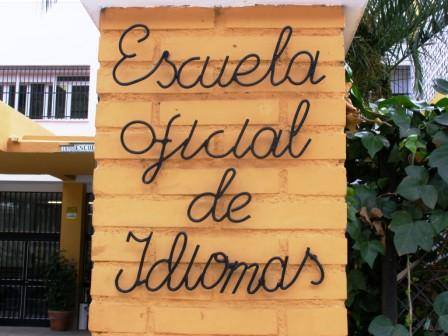 Yup, it's official. I'm officially a student at the slightly officiously-named Escuela Oficial de Idiomas (the Official School of Languages) in Málaga. And I think the teacher just might be officially a maverick. He certainly has the most unique teaching style I have ever come across. It's going to be great! Yup, it's official. I'm officially a student at the slightly officiously-named Escuela Oficial de Idiomas (the Official School of Languages) in Málaga. And I think the teacher just might be officially a maverick. He certainly has the most unique teaching style I have ever come across. It's going to be great!
From the opening class, it appears that the Language Points in these blog posts are likely to change in their nature. We'll see. But I suspect there will be fewer grammatical points and more .... umm ... well more about communication!
I received two official communications on the same day last week. One was a multa, a traffic fine. Speeding (just a little bit). 50€ payable at any branch of Santander. Done. Checking the date, it was either on the way or coming back from an intercambio coffee with Jose. Ah well. The four-month course at the Official School is only 70€ so mentally I will add the fine to that (and it is STILL a cheap course, even with the added multa!).
 The other was my exam results from last November. I am officially chuffed. I was classified as "Apto" which is the official "pass" category. I needed 60% in all sections to pass. I am officially delighted to have received an overall pass of 86%. It was the listening exercise and the prepositions that dragged it down - I got 91% in the writing exercises, and ..... drum roll please! ..... 100% in the oral communication and interaction part!!! Unbelievable! I am officially flabbergasted. The other was my exam results from last November. I am officially chuffed. I was classified as "Apto" which is the official "pass" category. I needed 60% in all sections to pass. I am officially delighted to have received an overall pass of 86%. It was the listening exercise and the prepositions that dragged it down - I got 91% in the writing exercises, and ..... drum roll please! ..... 100% in the oral communication and interaction part!!! Unbelievable! I am officially flabbergasted.
Fernando of course brought me back down with a bump in his opening speech of our new course. He pooh-poohed exam results (while admitting that many need them for work or university), and promised us that after his B2 course we would have a deep understanding of communication in Spanish, regardless of exam results.
The A1, A2, B1, B2, C1 & C2 international system has been in place for 14 years now, rolling out first across Europe and more recently adopted in Australia and the USA. I don't know how the levels are described officially by the 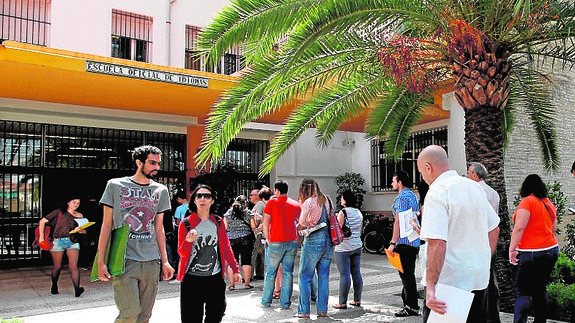 academic infrastructure that monitors them, but I doubt they use Fernando's descriptions. "A1 means you can tell someone your name" he said, waving a hand dismissively. "At A2 you can manage in shops and restaurants. B1 is about subsistence in a country - you won't die, because you can ask the way to places and get out of difficulties." The upper levels are where it gets more interesting, he said. "B2 is about beginning to communicate with people in Spanish the way you would in your own language." With light and shade, with jokes, with nuances and with subtleties. "C1 is about dominating the language, the culture and the literature, and at C2 it is about perfect fluency." academic infrastructure that monitors them, but I doubt they use Fernando's descriptions. "A1 means you can tell someone your name" he said, waving a hand dismissively. "At A2 you can manage in shops and restaurants. B1 is about subsistence in a country - you won't die, because you can ask the way to places and get out of difficulties." The upper levels are where it gets more interesting, he said. "B2 is about beginning to communicate with people in Spanish the way you would in your own language." With light and shade, with jokes, with nuances and with subtleties. "C1 is about dominating the language, the culture and the literature, and at C2 it is about perfect fluency."
Sounds good. This should be fun! And that's official.
© Tamara Essex 2015 http://www.twocampos.com
THIS WEEK'S LANGUAGE POINT:
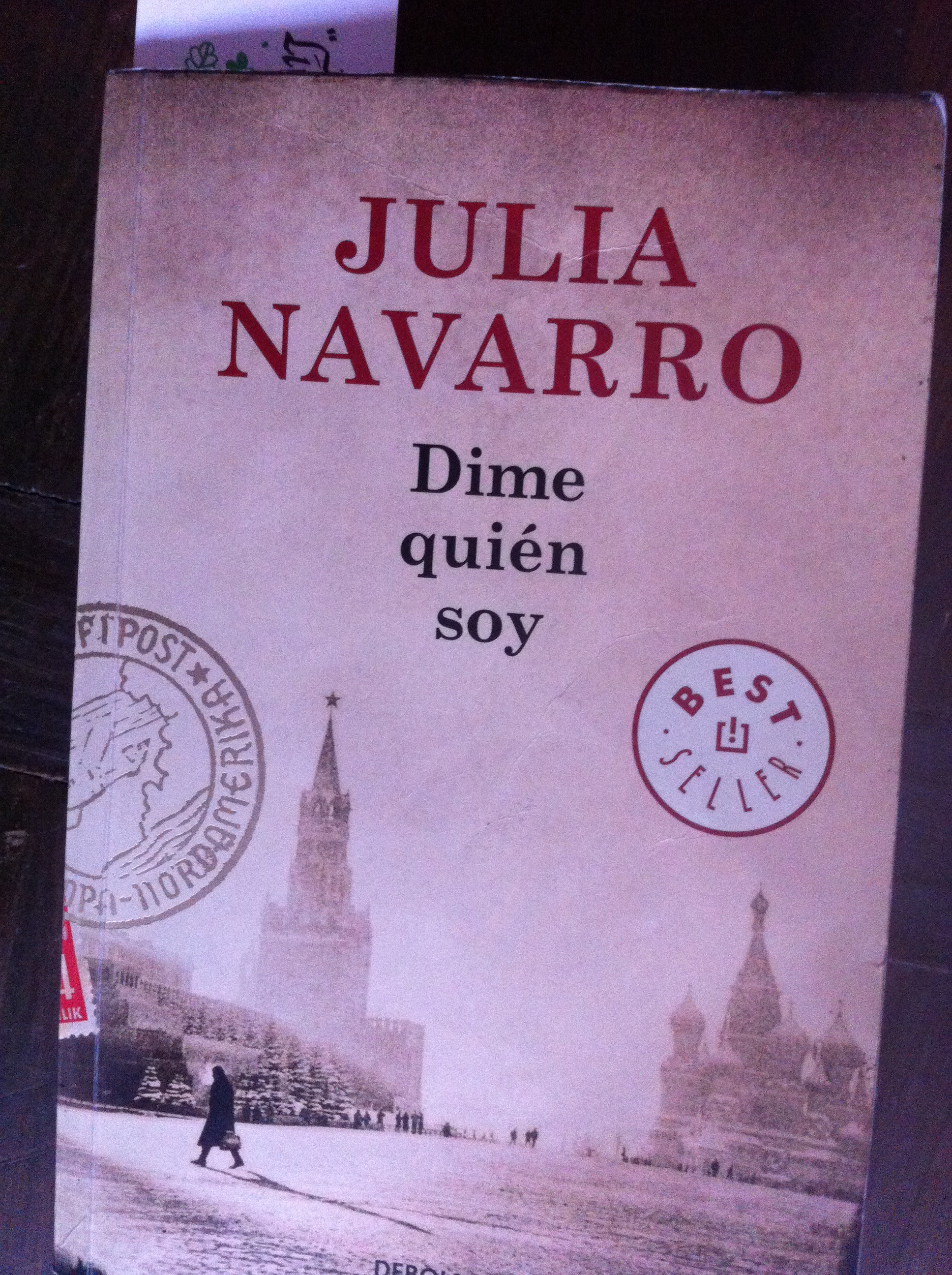
I came across a sentence in a novel I'm reading by Julia Navarro. It's a fascinating book about a young unemployed journalist asked by his aunt to research his great-grandmother (who was never spoken about in their family). It is going to go back through most of the last century, giving interesting background into life during the Spanish Civil War and afterwards.
Anyway, this sentence struck me as being particularly interesting in its use of tenses. The scene is the morning of an important dinner party .....
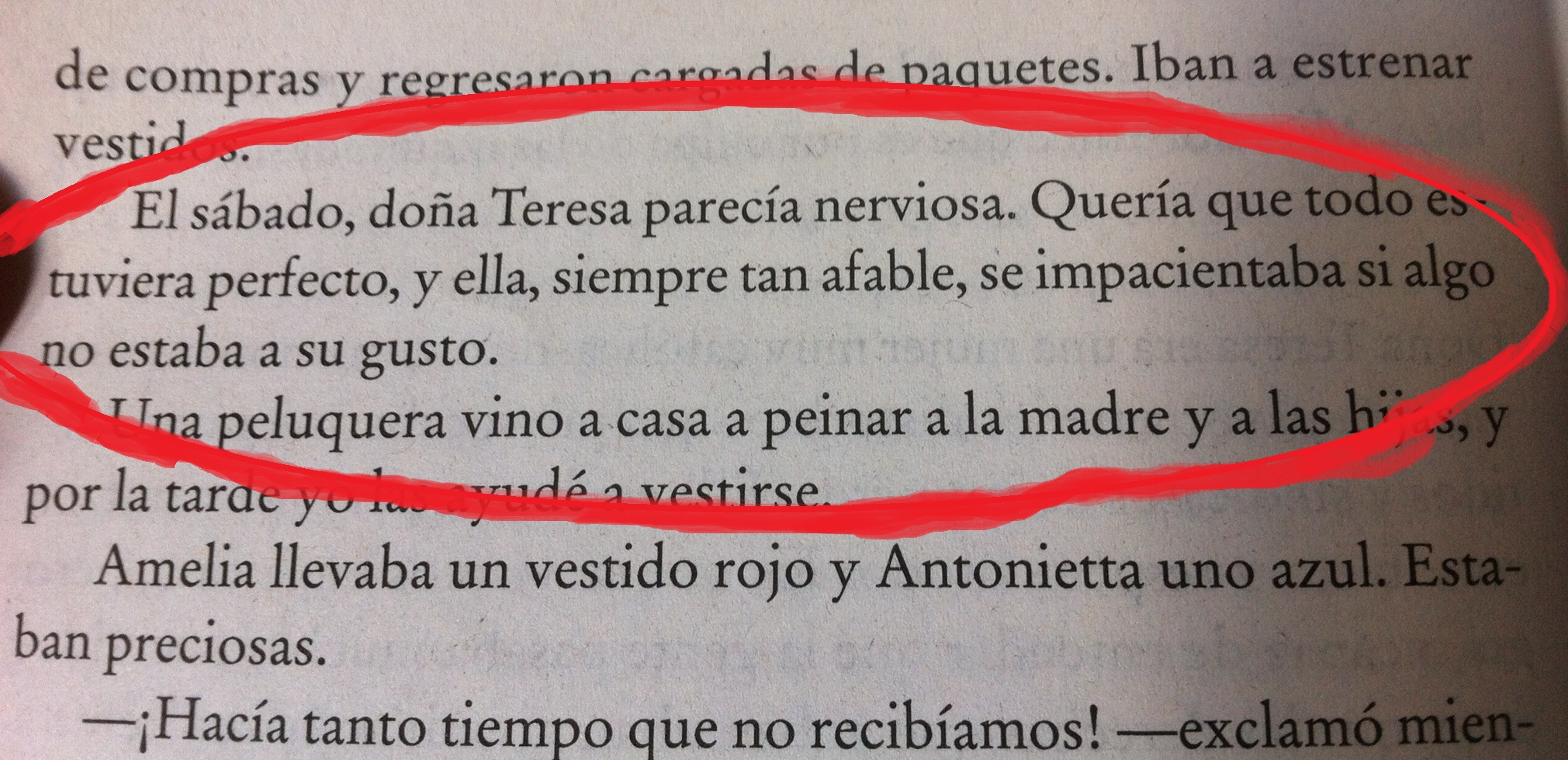
"On Saturday, doña Teresa appeared nervous. She wanted everything to go well, and she, always so affable, became impatient if something wasn't quite as she wanted."
I noticed in particular the subjunctive in the second sentence ("She wanted that everything were to be perfect...") and also the reflexive verb to become impatient or to make oneself impatient. I found myself reading it over and over again, trying to internalise the constructions. Now I just need to find someone who is preparing a dinner party so I can insert these phrases "casually" into the conversation!
 0
Like
Published at 4:17 PM Comments (4)
0
Like
Published at 4:17 PM Comments (4)
135 One Man and His Boat
Thursday, February 5, 2015
I didn't really fancy a museum. It was a nice Saturday morning in Pedregalejo, I'd had a couple of coffees with Jose and then moved on to the intercambio meetup in the bar next door. Nice to catch up with old friends there and meet new ones, helping everyone practise Spanish and English. Then someone suggested a museum. Not the best idea, I thought, I but wandered along with the group to the western end of Pedregalejo until we found ourselves outside a boatyard. And then it all suddenly, and surprisingly, got really interesting.
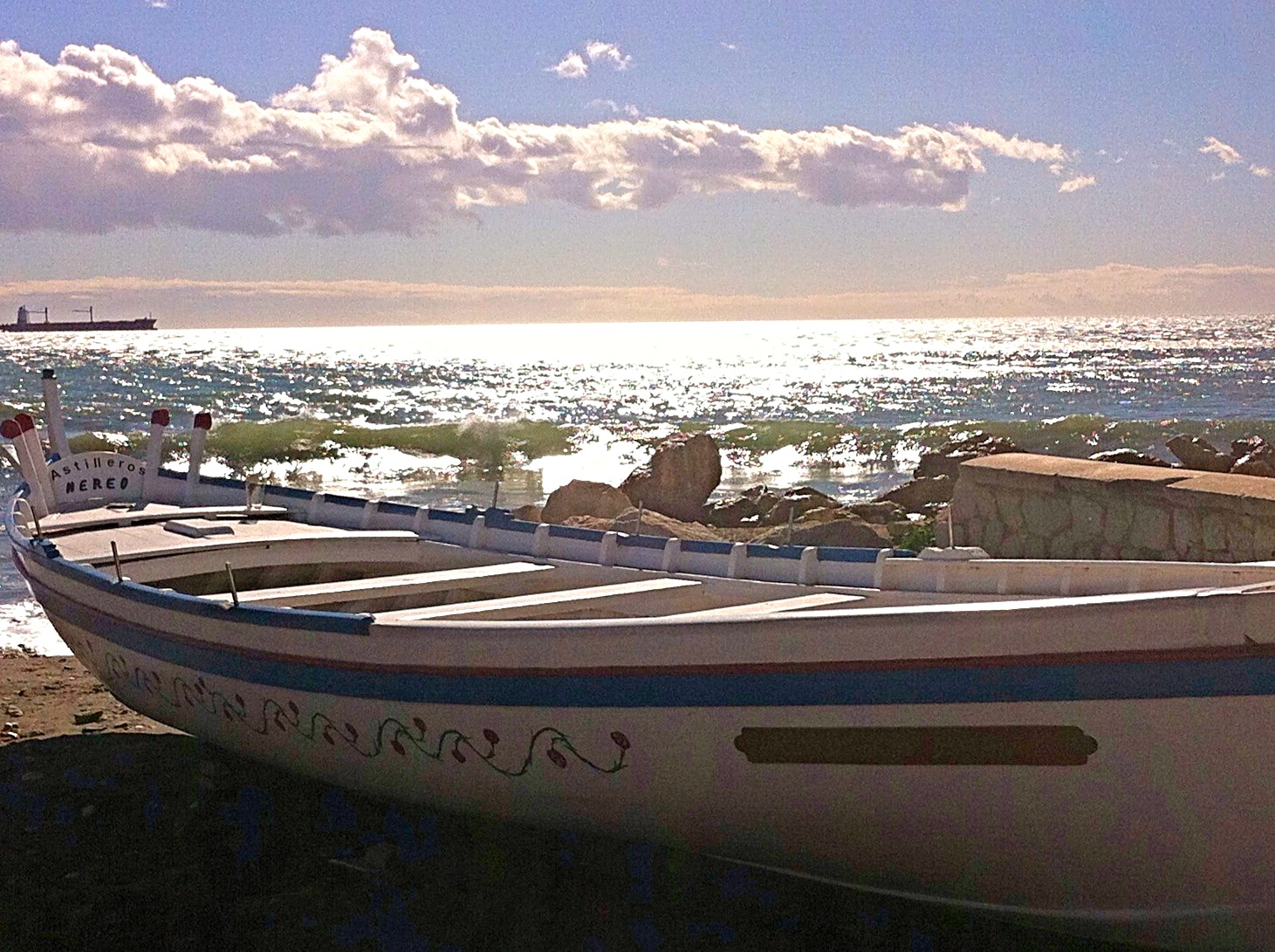 Alejandro is one of those people who could read the phone book and make it gripping. His passion for artisan boat-building is infectious, and his intimate connection to the boatyard where he as a child, and his father and grandfather before him, had fished, and repaired and built the fishing boats of Pedregalejo, brought this little stretch of Málaga's coastline alive. Alejandro is one of those people who could read the phone book and make it gripping. His passion for artisan boat-building is infectious, and his intimate connection to the boatyard where he as a child, and his father and grandfather before him, had fished, and repaired and built the fishing boats of Pedregalejo, brought this little stretch of Málaga's coastline alive.
In 1781 the Governor of Louisiana, Bernado de Galvéz (a Malagueño) sailed into Penascola (the British, and formerly Spanish, capital of Florida) to support the rebels and rout the English, for which he received many honours, including having the island of Gálveztown named after him. Two hundred years later the Spanish / North American links were strengthened with the birth of this project in 1999, to replicate his bergantín (brig) Gálveztown using the same materials and the same methods. Students from the University of Connecticut come on apprenticeship placements to learn the traditional boat-building skills.
 Finding the wood was a problem, as the right kind of oak does not grow in southern Spain. At the start of the project massive trunks were delivered from the USA, but few at a time. However the disaster of Hurricane Ike in 2008 which ripped up 40,000 enormous trees around Florida and Louisiana, Finding the wood was a problem, as the right kind of oak does not grow in southern Spain. At the start of the project massive trunks were delivered from the USA, but few at a time. However the disaster of Hurricane Ike in 2008 which ripped up 40,000 enormous trees around Florida and Louisiana, 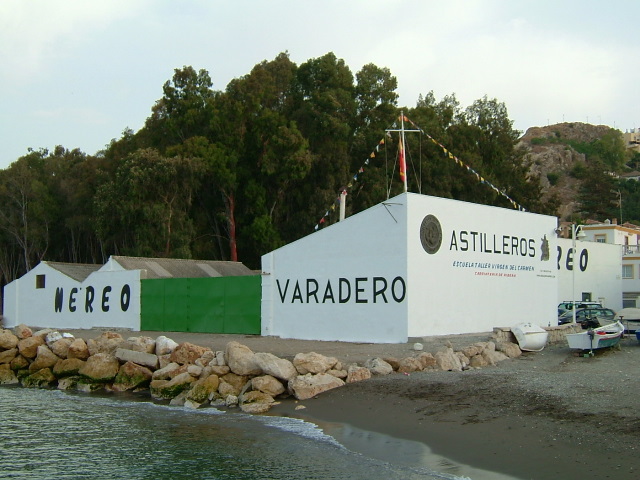 included the area around Galveston, so those connected with this international project were able to rescue something from the tragedy and donate 200 tons of the wood which then travelled from Houston to Málaga for more students and apprentices to cut, shape, and construct in this tiny but significant boatyard in Pedregalejo. included the area around Galveston, so those connected with this international project were able to rescue something from the tragedy and donate 200 tons of the wood which then travelled from Houston to Málaga for more students and apprentices to cut, shape, and construct in this tiny but significant boatyard in Pedregalejo.
Alejandro outlined the history to us in rapid Spanish. Although he had been told we were of a range of nationalities, some with limited Spanish, once into his subject his passion took over and he sped up. 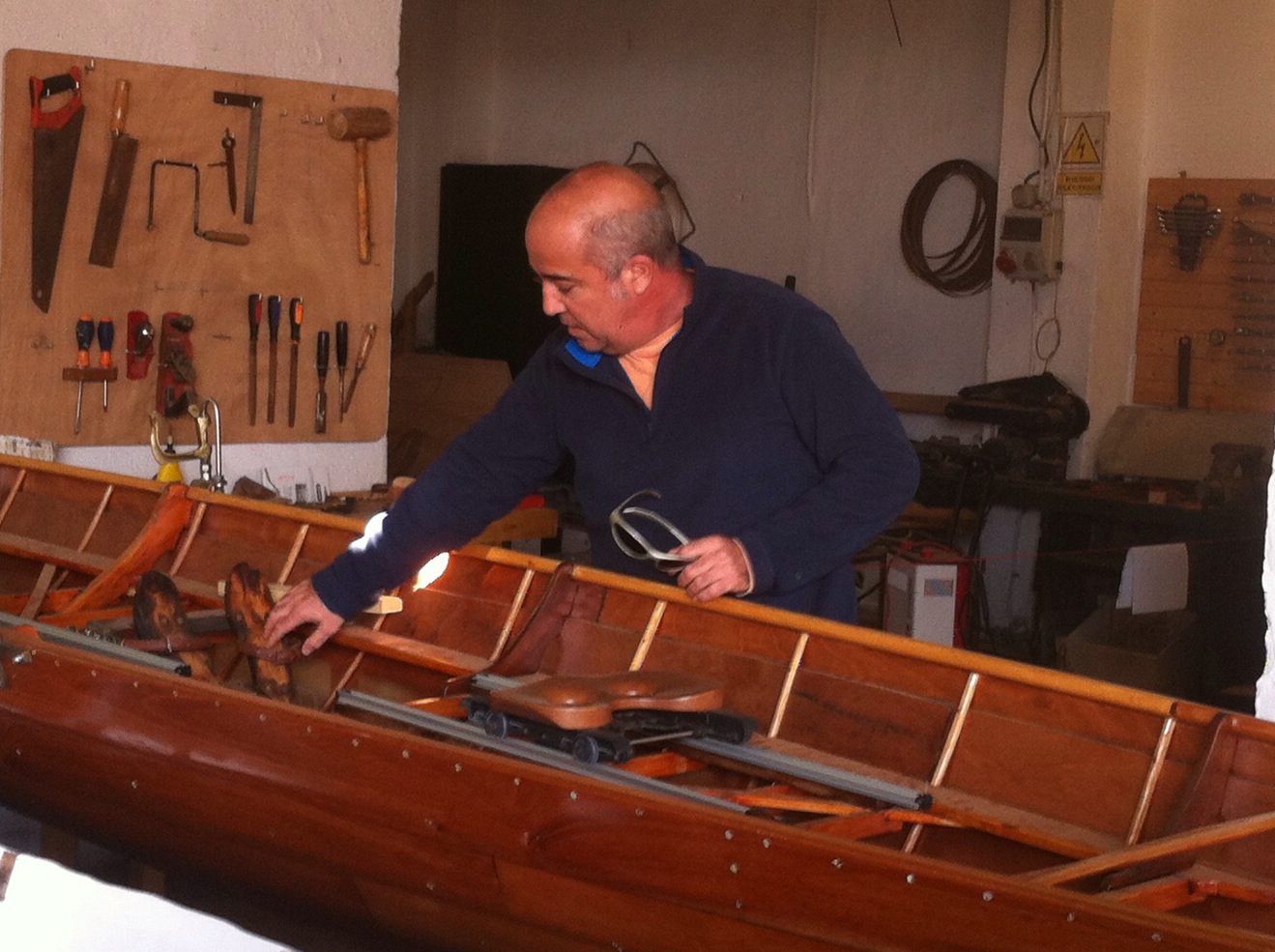 But the basis of the history was clear enough, and as he led us around the workshop showing us an almost-completed ocean racing boat, and a jábega (Malagueñan fishing smack), between us we picked up most of what he was telling us. But the basis of the history was clear enough, and as he led us around the workshop showing us an almost-completed ocean racing boat, and a jábega (Malagueñan fishing smack), between us we picked up most of what he was telling us.
The yard also functions as a site for local fishermen to get their repairs done, plus there are corners available to local people building their own boats, who can benefit from the onsite expertise. But the dominant project remains the massive rib structure, 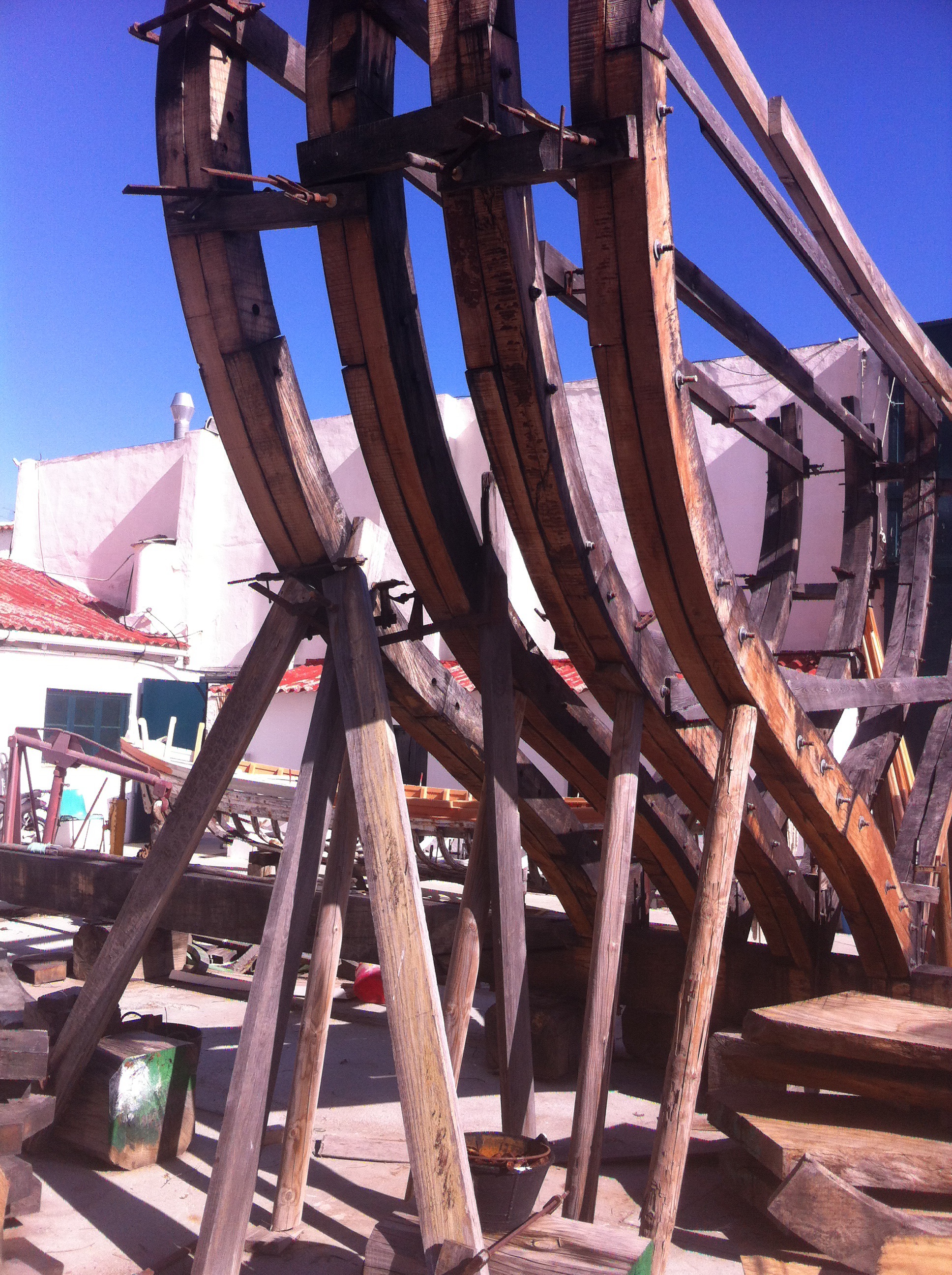 which will one day become a completed replica of the Gálveztown, and the American students in that far-off final year will have the honour of being there to launch her, and perhaps sail her across to Florida. which will one day become a completed replica of the Gálveztown, and the American students in that far-off final year will have the honour of being there to launch her, and perhaps sail her across to Florida.
Fifteen years from the start and the partial frame stands huge and proud in the yard. As to a completion date, Alejandro shook his head, smiling, unwilling to guess. Gaudi never saw his epic Barcelona project La Sagrada Familia completed. 133 years later it is still not finished, though the signs are that I may just see it complete within my lifetime. I'd love to see the Gálveztown finished too, but I'm unconvinced. Meanwhile, Alejandro and his team of local volunteers, topped up twice a year by groups of American students, bandage their blisters and work on, building a boat, building a dream.
© Tamara Essex 2015 http://www.twocampos.com
THIS WEEK'S LANGUAGE POINT:
Back to basics again! I have noticed that the thing I get corrected on more than any other is estaba and estuve. So I went for a top-up session with JuanMi at Axalingua Escuela de Idiomas here in Colmenar. He offered two bits of reassurance. Firstly, he told me that my friends were correcting that more than anything else because I'm probably using them more than many other words, and they are central to a sentence so my friends notice them more. Secondly, he told me that it is genuinely difficult to get right every time! And that sometimes Spanish people argue about which is right in a given sentence! Phew.
The best tip I can offer is that estaba, being the imperfect tense, is used when the story itself is imperfect, or unfinished. Spanish ears will wait for something more if you use estaba. "Estaba en Madrid." is not enough. It is an imperfect statement. Spanish ears will be waiting for "Estaba en Madrid cuando ocurrió el acidente." The other tip is that estaba will never be the most important part of the sentence. You being in Madrid or wherever is not the main subject.
"Estuve en Madrid" on the other hand is a complete phrase. You being in Madrid IS the main subject. “Estuve en Madrid dos meses en 2011.” It is also used for emphasis - "I WAS THERE!". For example - "Has oido de las manifestaciones de los Indignados en 2011?" "Si, hombre, ¡estuve allí!"
 0
Like
Published at 5:13 PM Comments (1)
0
Like
Published at 5:13 PM Comments (1)
Spam post or Abuse? Please let us know
|
|